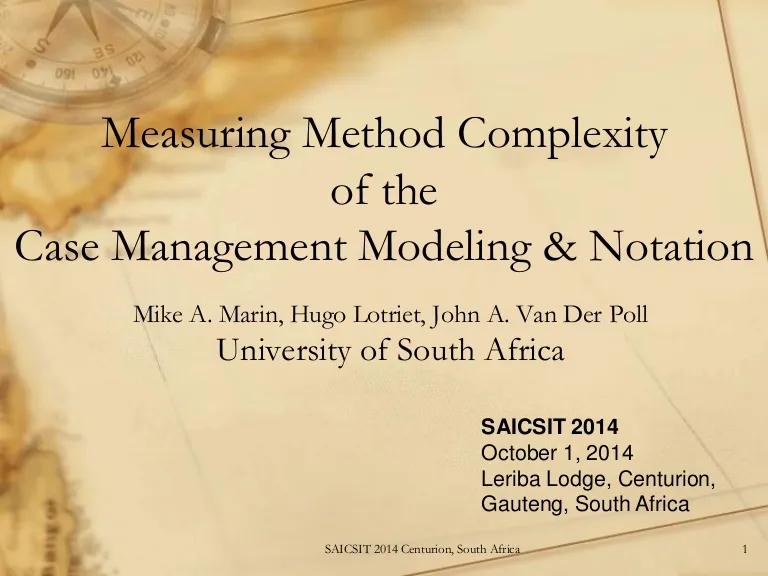Measuring method complexity of the case management modeling and notation (CMMN)
Description
Compares modeling notation between CMMN, BPMN, EPC, and UML Activity Diagrams using the meta-model based method complexity approach introduced by Rossi and Brinkkemper
Transcript
Measuring Method Complexity of the Case Management Modeling & Notation
Mike A. Marin, Hugo Lotriet, John A. Van Der Poll
University of South Africa
SAICSIT 2014
October 1, 2014
Leriba Lodge, Centurion,
Gauteng, South Africa
1
SAICSIT 2014 Centurion, South Africa Outline
•Motivation
•Business Process Management (BPM)
•Case Management Modeling and Notation
•Methodology
•Related Work
•CMMN Analysis
•Results
•Summary
•Future Work
SAICSIT 2014 Centurion, South Africa
2 Motivation
•There are multiple process notations to choose from but which one should be used for a particular project is left to the user
−Complexity of the notation method is just one factor to consider among others
•Try to understand CMMN method complexity in the context of other process notations
3
SAICSIT 2014 Centurion, South Africa Business Process Management (BPM)
•BPM technology is widely used by businesses
−Describes how a business process should be executed
−It automate business process in the enterprise
•Several notations
−Focused on three specific versions of
•Business process management and notation (BPMN)
−Multiple dialects
•Unified modeling language (UML) Activity Diagrams
•Event-driven process chain (EPC)
4
SAICSIT 2014 Centurion, South Africa The same process model in three notations
BPMN UML Activity Diagram EPC
Examples taken from Korherr, B.
Business Process Modeling – Languages,
Goals, and Variabilities. PhD thesis. 2008.
SAICSIT 2014 Centurion, South Africa 5
Case Management Modeling and Notation (CMMN)
•Version 1.0 released in May 2014
−Created by the object management group (OMG)
•Notation
−Compatible with BPMN
−Diamonds represent guards (pre-conditions)
−Rounded rectangles represent tasks
•Declarative
−Notation based on business artifacts with guard-stage-milestone
This model is semantically equivalent to the example in the previous slide.
6
SAICSIT 2014 Centurion, South Africa Differences between CMMN & BPMN
Most BPM notations
CMMN
Procedural
Declarative
Process centric
Data centric
Arcs describe the sequence
No predefined sequence
Guided work
(head down workers)
Enables workers
(knowledge workers)
Everything is modeled
Not everything is modeled
Page 6
CMMN was designed to be complementary to BPMN
7
SAICSIT 2014 Centurion, South Africa Methodology
• Used the meta-model method complexity metrics introduces by
Rossi and Brinkkemper in 1999.
− The methods to be compared should be described by a meta-model
• Rossi and Brinkkemper used the object, property, relationship, role (OPRR)
modeling language as the base meta-model
• All the other studies (including ours) used UML
− Based on counting objects, properties, and relationships and using them as
dimensions in a three dimensional space, the cumulative method complexity
is calculated as a vector in that space
• Requires a clear and consistent counting protocol
− Developed a set of counting principles
SAICSIT 2014 Centurion, South Africa 8
Related Work
•Previous studies on process model method complexity have been conducted, including
−Multiple dialects of BPMN 1.2
•Indulska, Muehlen, & Recker (2009) Measuring Method Complexity: The Case of the Business Process Modeling Notation.
−Compares UML Activity Diagrams to BPMN 1.2
•Recker, zur Muehlen, Siau, Erickson, & Indulska (2009) Measuring method complexity: UML versus BPMN
−UML 1.4 including Activity Diagrams
•Siau, & Cao (2002) How Complex is the Unified Modeling Language?
•All these studies used the meta-model method complexity metrics by Rossi and Brinkkemper in 1999
9
SAICSIT 2014 Centurion, South Africa Counting principles
•Developed a set of counting principles for UML based on the work of Indulska, Muehlen, & Recker (2009), taking into account
−Enumerations
−Abstract classes
−References between classes
−Internal tool generated properties that are never observed by the users
10
SAICSIT 2014 Centurion, South Africa Relationships in CMMN
•The notation provides a single connector (dashed line), which is used in two situations
−Optionally to indicate event propagation
•Represented in the meta-model by the onPart
(one abstract class and two concrete classes)
−Expanded planning table in a human task
•With no clear meta-model representation, because planning tables can be associated with stages
SAICSIT 2014 Centurion, South Africa
11 CMMN analysis
•Using the counting principles and the CMMN specification that describes its meta-model extracted
−39 objects
−4 relationships
−28 properties
•Removed from the counts 11 tool-generated properties
•For example, Id, exporter, exporterVersion, expressionLanguage, etc.
SAICSIT 2014 Centurion, South Africa
12 Method Complexity Comparison
Methods
Objects
Relationships
Properties
Cumulative Complexity
BPMN 1.2
90
6
143
169.07
BPMN 1.2 DoD
59
4
112
126.65
BPMN 1.2 Case Study
36
5
81
88.78
BPMN 1.2 Frequent Use
21
4
59
62.75
CMMN 1.0
39
4
28
48.18
EPC
15
5
11
19.26
UML 1.4 Activity diagrams
8
5
6
11.18
13
SAICSIT 2014 Centurion, South Africa Future Work
•The meta-model method complexity metrics introduces by Rossi and Brinkkemper in 1999 must be calibrated for UML
−Rossi and Brinkkemper used OPRR, which is simpler than UML
−UML is the most common modeling notation currently used to describe software standards
−A comprehensive counting protocol for UML needs to be created
•This study should be extended to the newer versions of BPMN, UML Activity Diagram, and EPC
−BPMN 1.2 had a single technique while BPMN 2.0 introduces multiple techniques
•Process diagrams, collaboration diagrams, conversation diagrams, and choreography diagrams
•Empirical validation of this research should also be conducted
14
SAICSIT 2014 Centurion, South Africa Summary
•Used the meta-model method complexity metrics introduces by Rossi and Brinkkemper to analyze CMMN
•Compared the results to previous work on BPMN 1.2, UML 1.4, and EPC by Indulska, Muehlen, & Recker (2009), Recker, zur Muehlen, Siau, Erickson, & Indulska (2009), and Siau, & Cao (2002)
•The results indicate that CMMN compares favorably to BPMN
15
SAICSIT 2014 Centurion, South Africa Questions & Comments
16
SAICSIT 2014 Centurion, South Africa
